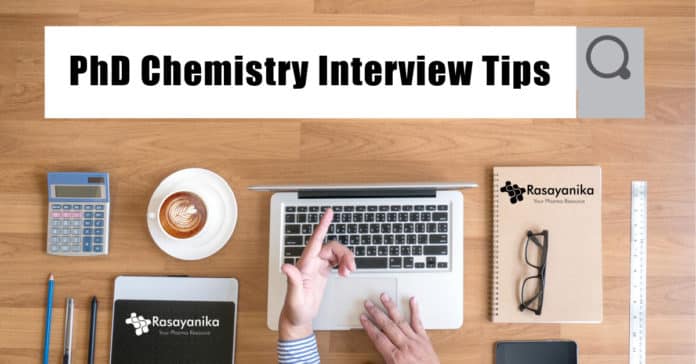Chemistry PhD Interview Tips – How To Attend Chemistry Interview?
Are you a chemistry graduate looking forward to a career in research? If so, the first step would be securing a PhD position in your field of interest. Once you have submitted your application, you will be definitely called for an interview if the admission committee considers you an appropriately qualified candidate. The interview is your opportunity to show the committee who you are, how motivated you are, and why you are the best fit for the particular PhD program. Your selection will be mostly based on your performance at the interview.
For all those students who are anxious about their upcoming PhD interviews, we are discussing here a few pieces of advice that would increase your chances of qualifying or cracking the interviews much better.
- Know Your Area of Interest
The first point you must know before attending any chemistry PhD interview is your area of interest. The area of interest is very important since you will be working on the same for the next four to five years. So choose your field of interest wisely.
Rather than choosing if you want to work on inorganic or organic chemistry
, be precise about the topic of interest. For example, if you are interested in organic chemistry, there are several topics in that domain, like nanocatalysis or organic catalysis, which you can choose to be your field. But if you believe inorganic chemistry is the field for you, there are many topics that come under this domain like supramolecular chemistry and magnetochemistry. You could also choose topics like photochemistry and enzyme catalysis if you are inclined to physical chemistry.If you are clear with your area of interest, it will help a lot with your interview.
- Do a Little Research About the Institute

For example, if you are interested in organic chemistry, you might already know it is incomplete without an NMR spectroscopy or high-resolution IR spectroscopy. So the second tip before attending a PhD interview in chemistry is that you must go through the institute website, supervisors, and the instrumentation facilities they provide. This will help you if the interviewer asks you why you want to join the institute.
- Keep Your Master Thesis Ready
Before going to an interview, make sure you have your master thesis ready in hand. Candidates often get questions related to their master thesis. You may even be asked to explain the research work you have done during the master project. So you should be prepared to answer any questions related to your master thesis.
- Be Mentally Prepared About the Environment
Candidates may often be given a board to solve questions. So you should be mentally prepared to solve the question on a black or whiteboard while the interviewers are watching on you. In most cases, you will be interviewed by a panel of scientists. You can expect a minimum of four members in the panel. It’s rare that a single person takes your interview. So be mentally prepared to face a panel of scientists.
- Send Personal Email to Professors Working on Your Area of Interest
Once you have listed the professors in the institute who are working on your area of interest, send a personal email to them, informing that you are interested in working under them. This can give you a positive impact since the interviewer is aware of your interests. But make sure you have good knowledge about the kind of research work they are doing and be ready to answer if they ask why you are interested in that particular research group. This is an important tip for those attending PhD interviews.
- Be Ready to Answer Any Questions Related to Your Field of Interest
Most of the interviews have a similar structure. You will be asked questions which you have to answer. They may start the questions at a very logical and basic level. They will be mostly from your area of interest. So learn about your area of interest as much as possible. Your next questions will be related to the answer you first gave.
For example, if you said your area of interest is spectroscopy, the next question could be to list different spectroscopic techniques. And the next to that could be to explain the principle of one of the spectroscopic techniques like NMR. So be prepared to answer such questions.
The interviewers often ask one or two difficult questions to the candidate. Those questions are asked to see how the candidate is approaching the question. Even if you are not able to solve the question, your effort, and your right approach to the question will leave a positive impression on the interviewers. So do not leave any question. Just give an approach. Sometimes, they may ask questions from areas far from your field of interest. In that case, you can answer the question if you know it; otherwise, you could politely tell them that you don’t know about it. And there is nothing wrong about acknowledging that you don’t know the answer.
- Never Give Complicated Examples While Answering Questions
When the interviewer asks a question, sometimes you might want to give an example to express your point. But giving a complex example will be like inviting more and more questions from interviewers. And you might get stuck into that one example. So one of the most important tips for attending PhD interviews is that you never try to give complex examples while answering questions. For example, if your area of interest is organic chemistry and the interviewer is asking you to distinguish between Sn1 and Sn2 reaction, use very simple reactions as examples. Never try to give a very complex reaction. This can help you in two ways. They will understand that you have the basic knowledge about the topic, and you won’t get yourself into trouble.
- Have a Solid Reason If You are Switching Fields
If you are switching your field, for example, you had your specialization in organic chemistry, and now you want to do a PhD in Physical chemistry, you should have a very reasonable and solid answer to why you want to switch the fields. You will definitely encounter questions regarding this. So you could say you did not find organic chemistry that interesting during your masters but found Physical chemistry rather interesting when you prepared for entrance exams. Whatever the reason is, be ready to convince the professors.
- Go For It and Enjoy the Experience!

So these are the few pieces of advice and tips for all those chemistry graduates who are looking forward to attending their PhD interviews. Make sure you follow them to give your best output. Rasayanika wishes you the very best for your interview.
Chemistry PhD Interview Tips – How To Attend Chemistry Interview?















































